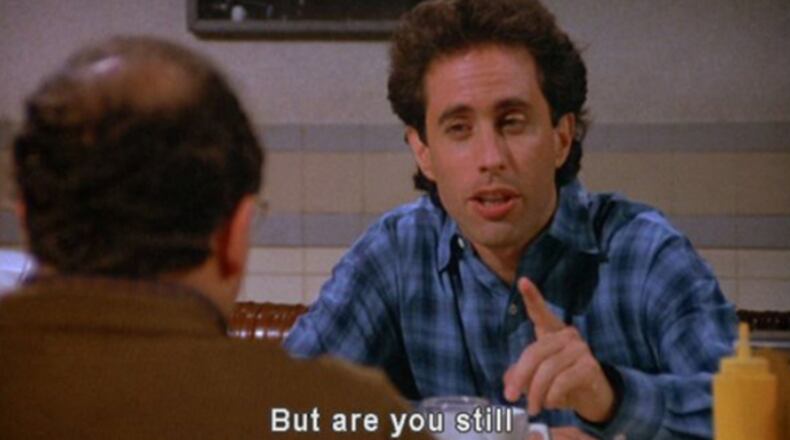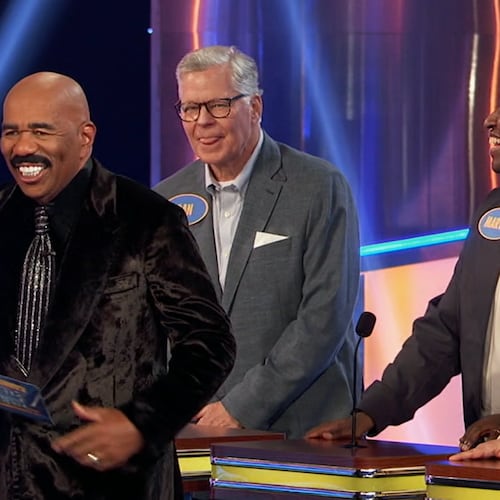By RODNEY HO/ rho@ajc.com, originally filed Monday, July 11, 2016
Yada yada yada. Not that there's anything wrong with that. Soup Nazi. Double dipping. Master of your domain. Puffy shirt.
Even passing fans of the show 'Seinfeld" would recognize those phrases as quintessentially "Seinfeld-ian." The show has been off the air 18 years yet still packs a punch in the pop culture world, fueled by daily repeats on TBS (30 times this week) and on-demand access on Hulu. And if you need a particular clip or meme to highlight a Facebook comment, they're out there on the Web somewhere.
Author Jennifer Keishin Armstrong decided to write about this phenomenon in "Seinfeldia: How a Show About Nothing Changed Everything," which came out last week. (The book is available on Amazon here for $16.39.)
Why now?
"Why not? The show is as omnipresent as ever," said Armstrong, a freelance writer and former "Entertainment Weekly" staffer who watched "Seinfeld" with dedication during her college years when the show was at its peak form. "Nobody has done a book like this on it. 'Seinfeld' won't die. It's fascinating. If you were an alien and landed here, you'd think the show was still on in its prime."
The book opens with the Brooklyn Cyclones minor league team selling out a 2014 "Seinfeld" theme night. It was so successful, the team now does it every year. (The most recent one was on July 2, with the slogan "Make Kramerica Great Again.")
And by the end, we learn about folks who created a popular Twitter feed with storylines as if the "Seinfeld' characters were around today that has more than 800,000 followers, followed by a person who started a Twitter feed mocking that same Twitter feed.
Credit: Rodney Ho
Credit: Rodney Ho
Armstrong tried to get interviews with the main players, including co-creators Larry David and Jerry Seinfeld, as well as key actors Jason Alexander, Michael Richards and Julia Louis-Dreyfus. But she didn't have any luck. She wasn't surprised or offended. She figured a lot of them would rather save their best stories for their own memoirs down the road.
At the same time, all of them have spoken extensively about the show over the years. There is more than enough primary source material for her narrative.
Armstrong said she had no expectation of finding any over-the-top new revelations given how much the media picked through the show's origins and run in real time. But that lack of access also forced her to get creative in terms of finding fresh insights. Some of her best new material came from the many writers who worked on "Seinfeld" over the years, most of whom had never been interviewed.
Credit: Rodney Ho
Credit: Rodney Ho
Ten years ago, I wrote a piece in the AJC about a local actor Lisa Mende who had a small part in "Seinfeld" and was still remembered for it. She played Carol, who told Seinfeld in an episode in a nasal, loud Fran Drescher-esque voice: "Jerry, I can't believe it took you so long to come see the BA-by! I kept saying to Michael, 'When is Jerry going to see the BA-by?' " While she wasn't able to parlay that role into a stable, long-term acting career in Hollywood, others have been able to turn their "Seinfeld" connections into cash.
Credit: Rodney Ho
Credit: Rodney Ho
Armstrong spent time with Larry Thomas, the actor who played the Soup Nazi for one episode. Off that single appearance, he now makes a full-time living as the Soup Nazi, going to conventions, restaurant openings and any event that will take him. "He's remarkably well adjusted about it," said Armstrong. "I said to him, 'You've got to be sick of this.' He said, 'It pays the bills and I'm happy people love this. It brings people joy.' "
Indeed, for a show about four people who do reprehensible things, "Seinfeld" does bring millions of fans genuine happiness. Armstrong thinks that may be why so many folks hated the 1998 series finale, which featured the four sent to jail because they failed to help a carjacking victim. During the "trial," their many misdeeds were recounted.
"My theory is it felt like a middle finger to America," Armstrong said. " 'Hah! You've been watching these terrible people for nine years.' It was a little bit dark and cynical for what America was anticipating as a celebratory, fun moment. Instead, they got this existential dark thing."
Credit: Rodney Ho
Credit: Rodney Ho
Another remarkably funny anecdote in the book is about a woman who showed up on "Seinfeld" for all of a few seconds as the poster art for a fictional film that became a fake adapted musical "Rochelle Rochelle."
Armstrong was interviewing a man who created fake movie posters of "Rochelle Rochelle" and stuck them on an empty theater in Times Square. He suddenly became inundated with demands for copies of that poster. But then he mentioned to her that the husband of the woman on the poster actually contacted him. She wanted a copy as well. So Armstrong ended up talking to her, an accountant with two kids who rarely talked about her brief moment on "Seinfeld," not even to a guy at her office obsessed with the show.
"The woman was never credited, never named," Armstrong said. "So that was one of my big scoops." (This "scoop" proves how difficult it was to actually come up with actual scoops in the world of "Seinfeldia.")
Credit: Rodney Ho
Credit: Rodney Ho
She said Hulu is bringing in a new audience of binge-watching Millennials (and younger) to "Seinfeldia."
"My next-door neighbors are young. We get a lot of NYU students. I can smell the pot coming from their apartment. When it came on Hulu, I was just finishing research on my book. I was starting to hallucinate 'Seinfeld.' I go into the hallway and hear the bass line from the theme song. They were bingeing the show for a week. Any time I walked out, I'd hear it. Then one time I heard silence. All of a sudden, I heard this voice: 'So George marries Susan.' Someone was explaining their relationship!"
As a reader and fan of the show, I enjoyed the book. I knew a lot of what had already happened from reading pieces over the years but to have it all in one place made it worthwhile. It helped that Armstrong writes in a breezy yet respectful style. As she said, "there's a value in putting it all together in one place and telling a story. I don't do just a list of trivia." (Yes, there are a fair share of "Seinfeld" trivia books.)
So far, she's gotten positive feedback. She was thrilled the New York Times gave it a good review. (The Times: "Ms. Armstrong can write. Here is her precise description of the two men at the time: 'Seinfeld had dark hair blown dry into the classic '80s pouf, while David maintained a magnificent Jew-fro, dented a bit in the middle by his receding hairline. Seinfeld's delivery often ascended to a high-pitched warble; David favored a guttural grumble that could become a yell without warning.' "
And so far on Amazon, she's garnered 4.5 stars from eight reviewers.
Writes Philip DeMarco : "The beauty of this work is the ability to appeal to a casual Seinfeld fan or the rabid face-painting Seinfeld fan in equal measure. Jennifer Keishin Armstrong provides a beautiful narration and at many points you feel like you are being escorted by a private tour guide through Seinfeld past, present and future."
About the Author
Keep Reading
The Latest
Featured









